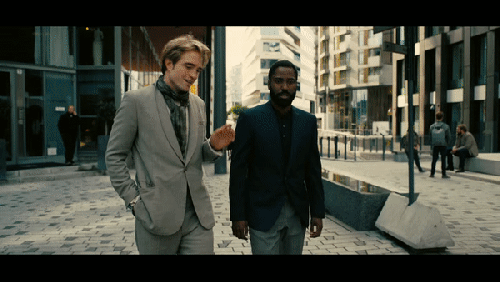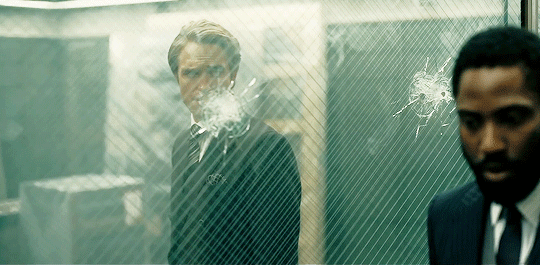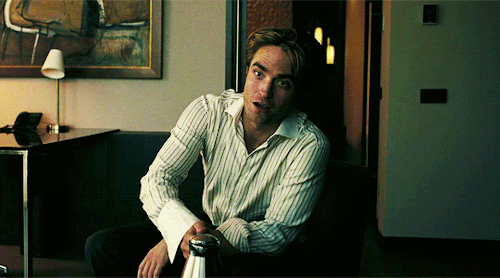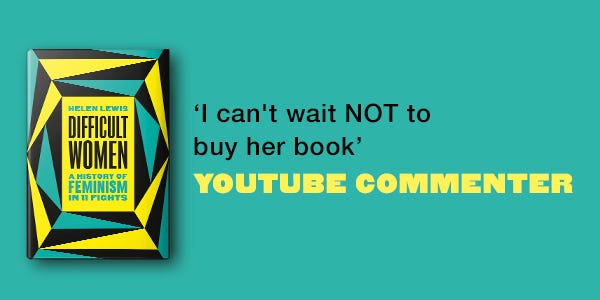Happy Friday!
It’s all kicking off, isn’t it? Since we last spoke, I’ve been to see TENET (shrug), David Hare’s Covid monologue (did what it said on the tin) and recorded an episode of the News Quiz (tonight, 6.30pm, Radio 4). The first two involved Sitting Among Fellow Humans, and the latter used a “virtual audience” over Zoom. (I was sceptical, but it really worked.) In all three cases, lord, it was nice to hear crowd noises again.
Also, my boss has published a cracking story about Donald Trump. The Spark is back from 16 September. I’m already hugely enjoying Left Out, the definitive post-mortem of the Corbyn project.
In other words, it feels a bit like normal life is creeping back. Fingers crossed.
Helen

Robert Pattinson’s 90s Foreign Correspondent wardrobe is the best thing about Tenet
Women Scientists Have The Evidence on Sexism (Atlantic)
In their own research, scientists run randomized double-blind experiments, in which neither the scientist nor the subject knows who has received an experimental drug or a placebo, because they recognize their biases could cloud their interpretation of the data. Yet no such safeguards are in place for most of the decisions that affect the career of women scientists. Letters of recommendation for women are shorter and stress that the applicants “work hard” and are “diligent,” while letters about men use words such as outstanding and superstar.
This is as good a time as any to say that I’m writing another book, and it’s about genius. One of the many strands of it will be: who gets called “brilliant”? who gets encouraged to pursue their talents to the fullest? Another strand will be: yikes, there are a lot of books about genius which are clearly intended to secure their author a career on the corporate speaking circuit.
The Inside Story of The Wirecard Fraud (Financial Times)
At 12.30, Murphy slipped out of the FT HQ for a quick crab sandwich and glass of wine at Sweetings, an archaic lunch spot just across the river. But suddenly he was back and visibly alarmed. “We’ve got a leak! We’ve got a bloody leak!” he said to me. At Sweetings, he’d taken a call from a market trader, who said he’d heard there was a Wirecard article coming at 1pm and wondered what we were reporting. We sat and rolled through the names of those who knew we were planning to publish that day: the two of us, Nigel the lawyer, Lionel the editor. That was it. The copy wasn’t even in our content-management system yet. There was no leak from the FT. The penny dropped: any leak must have come from Wirecard.”
Wirecard looked like a solid, respectable company. But an FT investigation revealed irregularities in its books (and eventually, that more than a billion dollars of transactions were, simply, imaginary). The most remarkable part of this story is the dirty tricks campaign Wirecard waged against the newspaper, and particularly the lead reporter. It accused the FT of being in cahoots with short sellers: essentially, publishing negative stories solely to tank its share price. For a while, the German regulators seemed more interested in that than the fraud happening under their noses. It’s the details which make this story: the surveillance handbag; the security protections such as switching off your wifi router overnight; the sheer number of ‘reputation management’ firms which latched on to Wirecard (it was spending £120m a year on “advice” by the end).
Reading this, it will hit you: The bad guys have lots of money. Journalists who want to expose them need deep pockets, too.

In Our Family’s Darkest Moment, A Stranger Helped (Atlantic)
I miss strangers. I long for connections with people I do not know. We are so separate now. We have so few opportunities for brief interactions: a random shared joke with someone in an elevator. A quip that turns into a conversation with a store clerk. Even the banter with a chatty restaurant server. I’ve always known that I get a lot of satisfaction from talking with people I don’t know about things that matter to them—that’s why I interview people for a living. But the pandemic has made me realize how much I need even the most casual interactions with strangers. I need those people to feel less strange. I need to feel like we aren’t all floating around in our own bubbles, concerned only with the health, pocketbooks, and survival of ourselves and the ones we love. Because if we stop being able to connect with those we don’t know, if we stop being able to see ourselves in them, our empathy starts to atrophy. And then where are we as people? As a society? What are we left with?
Until reading this, I hadn’t quite surfaced this thought. I’ve stayed in touch with my close friends and family, but what I’ve really missed in the last six months is all those little moments of serendipity.

Quick Links
Can’t beat Jesse’s proposed headline for this piece. (Medium)
“A strange phenomenon has emerged near Amazon.com Inc. delivery stations and Whole Foods stores in the Chicago suburbs: smartphones dangling from trees.” (Bloomberg)
“The point is this: you don’t need to do anything wrong to get death threats, rape threats, etc. You just need a big enough audience.” Never become famous, and particularly, never become internet-famous. (Tim Ferris’s blog)
Regular readers will know that I sometimes read sentences about Sophie Lewis and get confused that they’re not about me. (“Lewis’s vision of feminism is inherently communist…”) That confusion is not likely to arise between her partner and my partner, because hers believes in looting: “you get to the heart of that property relation, and demonstrate that without police and without state oppression, we can have things for free”. (NPR)
“What do you want me to say? What they want you to say is, ‘I enjoyed being a part of it. It was a great experience...’ Nah, nah, nah. I’ll take that deal when it’s a great experience. They gave all the nuance to Adam Driver, all the nuance to Daisy Ridley. Let’s be honest. Daisy knows this. Adam knows this. Everybody knows. I’m not exposing anything.” John Boyega in GQ.
Advertisers are told that it’s bad to put their ads alongside “negative” news coverage. But who decides what’s negative? (A hit-and-miss algorithm.) And where does the spend go instead? (To dodgy sites.)
GENERIC THRILLER by BIG TIME WRITER. Love this analysis of the cliches of book jacket design.
Had never heard of these “friend of the police” cards. Should be outlawed, IMO.



